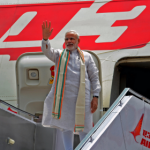Eight months after his visit to the United Arab Emirates (UAE), Prime Minister Modi is heading back to the Arabian Peninsula—this time, to Saudi Arabia. There are obvious reasons for this trip: Saudi Arabia is India’s larger supplier of oil; it hosts 2.8 million Indian expatriates; and the oil producing monarchy is an obvious candidate for investing in India. Besides, Saudi and Indian leaders have been routinely exchanging top-level visits over the past decades. But there is more to this trip than the usual protocol.
Since his inauguration as Prime Minister in May 2014, Narendra Modi has engaged in an overhaul of India’s diplomacy—-not exactly a reset, but a fine-tuning of the fundamental tenets of India’s foreign policy. Many a commentator expected his first visit to West Asia to be to Israel, and were somewhat taken aback when, instead, he elected to travel to Abu Dhabi and Dubai. Now, it is Saudi Arabia’s turn.
The turning point in the relationship was King Abdullah’s visit to India in January 2006, when he was the guest of honour on Republic Day. The Saudi Kingdom, too, has embarked on its own “Look East Policy”. Saudi Arabia needs to secure long-term customers for its hydrocarbons, especially as the United States does not require them any longer, thanks to its shale oil and gas. India and China are exactly what Saudi Arabia craves: fast-developing economies with a huge population and soaring energy needs.
Regardless of the state of its relations with the United States—pretty low at the moment—Saudi Arabia is looking for stable and reliable partners, not new allies to replace the Americans. The Saudi-U.S. alliance has survived so much turbulence over the decades that it is safe to assume that it is not going to dissolve anytime in the foreseeable future. In any case, neither China nor India is interested in replacing the United States in the Gulf, so there is no misunderstanding about anyone’s role.
Besides the above-mentioned talking points (the economy and Non-Resident Indians), there will be, of course important discussions on political issues. Among them, two are more sensitive than others—namely, Pakistan and Iran.
Ahead of Modi’s visit, Saudi Foreign Minister Adel al-Jubeir has insisted that Saudi Arabia’s “relations with Pakistan do not come at the expense of [its] relations with India”. What was unsaid, but implied is that the strengthening of Saudi ties with India will not result in the cooling down of its relations with a country which is “a historic ally [that] will remain so”.[1] The importance of Pakistan for Saudi Arabia is best illustrated by the hurried visits to Islamabad last January of both Adel al-Jubeir and the Deputy Crown Prince and Defence Minister Mohammad bin Salman only days apart, after Pakistan had declined to be part of the 34-Islamic nations coalition formed by Saudi Arabia.[2] However, Riyadh cannot conceal its irritation at Islamabad’s obstinate refusal, first to commit troops in Yemen (April 2015) and, thereafter, to join the Saudi-led “coalition against terrorism” (December 2015). This is a window of opportunity India can take advantage of—for instance, in getting Saudi Arabia to agree on a joint communiqué condemning the states using religion to sponsor terrorism, as it did successfully last August with the UAE. Pakistan’s leading newspaper, Dawn, then rightly analysed it as a “wake-up call for Pakistan”.[3]
The real test will be Iran. Delhi enjoys good relations with Tehran and, not unlike India with Pakistan, Saudi Arabia tends to judge its partners against the yardstick of its own relations with Iran. It is unlikely that Riyadh will openly pressure India into distancing itself from Iran, but if it does, India will have no option but to resist such pressure. From a strategic point of view, India needs Iran: to help stabilise the situation in Afghanistan; for the supply of oil and gas; and as a corridor to Central Asia via Chabahar port. Moreover, India should, at all cost, stay away from the sectarian strife pitting Saudi Arabia against Iran, if only because Shias account for more than a quarter of Indian Muslims.
India should also resist the temptation to offer to mediate between the two Gulf countries. Both Chinese President Xi Jinping and Pakistani Prime Minister Nawaz Sharif, when visiting Riyadh and Tehran in January, did not venture to do so. In fact, such is the divide that nobody can be a mediator currently.
King Salman and Narendra Modi will find common ground to intensify cooperation against jihadi terrorism. There is already in place a little known but effective intelligence cooperation that has led to the deportation of several suspected terrorists to India , including Abu Jundal, linked to the 26/11 attacks in Mumbai and sent back to India in June 2012. ISIS, too, is a common enemy: it has made it clear that the Saudi dynasty is a prime target and the organisation is also a major source of concern for Indian intelligence.
Indian and Saudi leaders may differ, even deeply, on a whole range of topics, but they are unlikely to raise them publicly, if at all. On the other hand, they do need each other on issues both countries consider vital from their own standpoint. This is the only solid basis for long-term relations between the two.
Olivier Da Lage is editor in chief at Radio France International. He contributes to Gateway House in his personal capacity.
This article was exclusively written for Gateway House: Indian Council on Global Relations. You can read more exclusive content here.
For interview requests with the author, or for permission to republish, please contact outreach@gatewayhouse.in.
© Copyright 2016 Gateway House: Indian Council on Global Relations. All rights reserved. Any unauthorized copying or reproduction is strictly prohibited
[1] Bagchi, Indrani, ‘India is our strategic partner, Pak historic ally: Saudi mantri’, Times of India, 10 March 2016, http://timesofindia.indiatimes.com/india/India-is-our-strategic-partner-Pak-historic-ally-Saudi-mantri/articleshow/51335386.cms
[2] Da Lage, Olivier, ‘Coalition of the unwilling’ Gateway House, 24 December 2015, https://www.gatewayhouse.in/saudi-coalition-of-the-unwilling/
[3] ‘Modi in the UAE’, Dawn, 20 August 2015, http://www.dawn.com/news/1201503/modi-in-the-uae/


